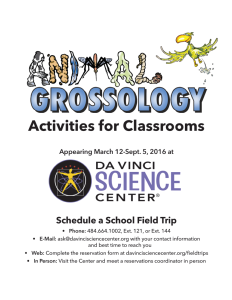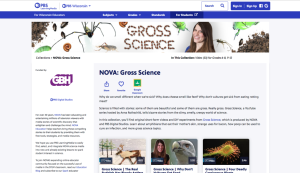Theme: Gross Science
Back to Top
|
 |
|
Science Friday: The Many Types of Mucus
|
Science |
|
The word "mucus" evokes strong feelings of disgust, yet this humble substance serves many important functions for our bodies. In this one-hour lesson plan written by educational program manager and former teacher Xochitl Garcia, students of all ages will learn about mucus, create their own slime and mucus models, and explore mucus in the animal kingdom. On the page linked above, visitors will find the lesson plan, including reference materials, audio-video resources, and directions for making mucus out of common household substances. In the section More Mucus Awesomeness Explained!, visitors will also find links to further reading suggestions. The lesson plan conforms to NGSS Standards and Science and Engineering Practices, which makes the materials and activities easy to integrate in life science, biology, or biochemistry classrooms. The Many Types of Mucus is offered by Science Friday, the highly regarded syndicated radio show and educational content creator (previously featured in the 07-02-2021 Scout Report). [MJZ] |
|





|
|
 |
|
Animal Grossology Activities for Classrooms
|
Science |
|
The Animal Grossology Activities listed in this document are tied closely to an exhibition of the same name at the Da Vinci Science Center. Originally part of the Lehigh University in Bethlehem, Pennsylvania, the center is now an independent non-profit with exhibits and programs that make science fun and accessible for learners of all ages. In a nod to Sylvia Branzei's popular children's books, both the exhibition and this curriculum are sure to appeal to kids of all ages with a focus on an array of fascinating subjects, such as creating models of animal skat, fish printing, and even making mealworm crispie treats. Through the exercises outlined in this PDF document, students will learn about the behaviors of birds, fish, reptiles, and mammals, as well as deepening their understanding of scientific observation, measurement, anatomy, dissection, and much more. The interactive activities "harness kid's natural curiosity about themselves and teach them about how animals function." Beyond their usefulness in traditional classroom settings, the lessons included would be ideal to integrate into science centers, after school programs, and homeschooling lessons. [REB] |
|





|
|
 |
|
Forensic Entomology, Or What Bugs Can Tell Police About When Someone Died
|
Science |
|
Trust Me, I'm an Expert is a podcast produced by the independent, nonprofit publication The Conversation (previously featured in the 03-24-2017 Scout Report). The podcast is dedicated to getting the facts directly from specialists in their field, often drawing in experts on unusual subjects. One such topic is the focus of this short interview, which discusses the value of insects in the field of crime scene forensics. The episode features conversations with two scientists from the Australian Facility for Taphonomic Experimental Research (AFTER), Maiken Ueland and James Wallman. AFTER is what some call a "body farm" - a place where human decomposition is studied. The experts discuss how insects can be an integral piece of the puzzle in crime-solving because of their ability to detect death long before humans can, their profound impact on decomposition, and their use in determining time elapsed since death. The AFTER scientists also discuss how weather and time of year are important factors for decomposition and for insects' life and breeding cycles, which further narrow down the possibilities for time of death. In addition to this episode, readers are sure to enjoy other episodes of Trust Me, I'm an Expert, which is available on Apple and Google Podcasts, Spotify, Stitcher, Radio Public, and more. [RMP] |
|





|
|
 |
|
NOVA: Gross Science
|
Science |
|
Produced by NOVA and PBS Digital Studios (previously featured in the 06-12-2020 Scout Report), the aptly named Gross Science YouTube series provides a variety of short videos and DIY experiments ideally suited for classrooms and other formal and informal educational settings. Answering questions many of us have wondered about, such as why vultures do not get sick from eating rotting meat, this well produced series provides a wealth of science-rich information through humorous and, frankly, really gross anecdotes and stories. Viewers will learn "about amphibians that eat their mother's skin, strange uses for bacon, how poop can be used to cure an infection, and more gross science topics." Hosted by Anna Rothschild, this series harnesses the storytelling ability NOVA is known for and employs a mix of live-action video and animation to explain everything from genetic drift to gastrointestinal issues. Tailored to a younger audience and designed to help kids understand fundamental scientific concepts, these appealing videos are short enough to easily integrate into in-person and online learning environments and are fully captioned for accessibility. Readers can find the videos embedded in the page linked above or go to the YouTube channel by clicking "Gross Science" in the text description. [REB] |
|





|
|
 |
|
Why Disgust Matters
|
Science |
|
We have all felt disgust, to one degree or another, in many contexts. PubMed Central, the full-text biomedical and life sciences archive from the National Institutes of Health's National Library of Medicine, offers the peer-reviewed article "Why Disgust Matters," from the journal Philosophical Transactions B. The article is an insight into this "powerful, but poorly-understood," feeling. Written by Valerie Curtis of the London School of Hygiene and Tropical Medicine, "Why Disgust Matters" synthesizes ideas about how disgust as a system evolved to motivate infectious disease avoidance. It may seem obvious that disgust can be used to combat behavioral causes of infectious and chronic disease, but the article points out that disgust also plays a significant role in anxieties and phobias, has hidden costs for several fields of work, and can be abused to promote prejudice and stigma. This synthesis proposes that the study of disgust can help people flourish and provides a compelling model for the study of this very human emotion. [RMP] |
|





|
|

















